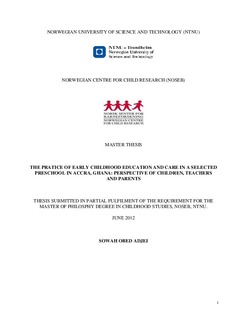| dc.contributor.advisor | Nilsen, Randi Dyblie | nb_NO |
| dc.contributor.author | Sowah, Obed Adjei | nb_NO |
| dc.date.accessioned | 2014-12-19T14:37:29Z | |
| dc.date.available | 2014-12-19T14:37:29Z | |
| dc.date.created | 2012-10-16 | nb_NO |
| dc.date.issued | 2012 | nb_NO |
| dc.identifier | 560875 | nb_NO |
| dc.identifier.uri | http://hdl.handle.net/11250/269063 | |
| dc.description.abstract | Over the past decades, early childhood education and care have been hidden from public awareness but has now become a current issue on the international agenda, in Africa, as well as in Ghana. However, knowledge about and analysis of children everyday life experience and their perception about the practices in their early childhood institution have received less attention especially in Ghana. Considering the cultural settings of Ghana, children are hardly consulted to provide their own account of matters that concern them rather their significant adults are used as their proxy raters. It is against this background that the study aims to ‘listen to the children’s voices’ and to place their views alongside the perceptions of their significant adults. The study draws inspiration from the Social Studies of Children and Childhood and the Liberationist thesis under children’s rights and position children as right-holders and social actors who are active participants in their own lives and in the society in which they live. Therefore, this study involved children as the principal informants alongside their significant adults.
As a qualitative study which is ethnographic inspired, data were collected using multiple participatory methods such as participant observations, focus groups discussion, drawings and semi-structured interviews. The fieldwork was conducted in a selected preschool in Accra with ten children as the main informants as well as six teachers in the same institution. In addition, six parents of the children in the institution were interviewed as part of the adult informants.
The study revealed that the reasons for attending early childhood institution are; children were seen as the future insurance for their parents; economic as well as promoting school readiness. The features that determine parents and teachers understanding about "high quality" ECEC is the component of the curriculum, the nature of the school environment and the attribute of the teachers. The study also reveals that in their everyday lives in the school, the children integrate responsibilities, academic work and play. It also came to light that the parents and teachers emphasize academic work as the main form that preschool should take as against play but the children suggested otherwise. As an institution, it is confronted with different challenges and these were identified by the informants and they suggested various solutions to help curb some of these challenges. | nb_NO |
| dc.language | eng | nb_NO |
| dc.publisher | Norges teknisk-naturvitenskapelige universitet, Fakultet for samfunnsvitenskap og teknologiledelse, Norsk senter for barneforskning | nb_NO |
| dc.subject | Social and Behavioural Science, Law | en_GB |
| dc.title | The practice of Early Childhood Education and Care in a selected preschool in Accra, Ghana: Perspectives of children, teachers and parents | nb_NO |
| dc.type | Master thesis | nb_NO |
| dc.contributor.department | Norges teknisk-naturvitenskapelige universitet, Fakultet for samfunnsvitenskap og teknologiledelse, Norsk senter for barneforskning | nb_NO |
